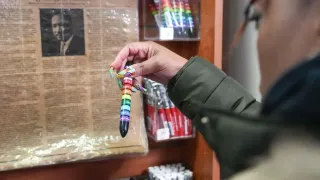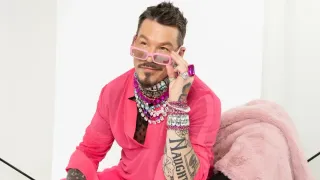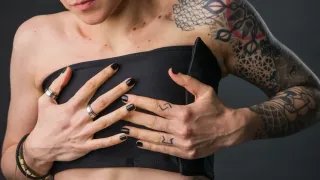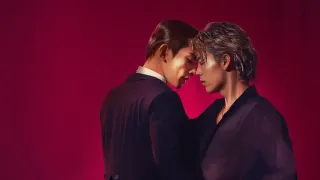May 3, 2024
EDGE Interview: Nava Mau Learned Something New About Herself While Filming Netflix's Hit 'Baby Reindeer'
Timothy Rawles READ TIME: 5 MIN.
There might not be a hotter show on Netflix right now than "Baby Reindeer." It tells the true story of a bisexual man named Donny Dunn (Richard Gadd), a stand-up comedian who is being stalked by an unhinged woman named Martha (Jessica Gunning). But that might be the least of his troubles because he is also being unconsciously sexually assaulted, battling a drug addiction, and bombs miserably on stage. Yet it's somehow an uplifting show.
Holding everything together is Donny's girlfriend Teri, a therapist who also happens to be trans. Played by Nava Mau, Teri is the voice of reason but is also a secondhand victim of Donny's trauma, resulting in serial rejection and relentless gaslighting throughout their relationship. Mau wasn't intimidated by the script, which only included the first episode when she first got her hands on it. Nevertheless, she felt immediately drawn to it. She auditioned for the role based solely on what little she knew, but it wasn't a limitation.
"I was actually at a film festival during this process and so I was reading it at night and I could not go to sleep," she tells EDGE, in a soft-spoken voice. "I could not stop reading. I couldn't stop thinking about it. I was just...I was riveted. I felt so connected. You know it's the greatest gift to read a script that feels like it's someone speaking directly to you."
Once she received the entire script, her empathy for Donny had a duality. She felt for both of them, even though the material was intense it seemed organic both on screen and on set. She related to the story being told.
"I think it allowed me to put myself inside the mind of Teri the character because it's clear that she sees him," Mau says. "Even when he doesn't want to be seen. Teri has this professional background as a therapist, which I think allows her to understand Donny maybe better than others might."
Mau's work in healing justice also helped her navigate through the story's complicated layers. Donny makes some decisions that aren't rational, but his mental health is struggling, and Mau understood the intricacies of this flawed human being.
"I didn't want to judge any of the characters," she says.
As a trans woman, Mau reflected on her trauma too. She brought some of that into portraying Teri's story. In some ways she and Donny's stories are similar but with different dynamics. Her performance in "Baby Reindeer" is restrained, but no less powerful. It had to be.
"I had to approach it from a human place you know," she says. "There was no way to get around the reality that I was acting in these really intense, intimate, emotional scenes with the person who had actually lived the life that this story is based on."
There are a few times when Mau and Gadd have sex scenes together – or are supposed to. In one of them, Gadd's character is unable to perform because of everything going on in his life. Teri feels rejected and her reaction is heartbreaking.
Mau says she drew inspiration from the trans community and the obstacles they often face in society for that particular sex scene. She took a leap and rolled with it, which not only speaks volumes about her as an actress but also as a person.
"What was really helpful was having an intimacy coordinator on set," Mau says. "I think, alongside the director and Richard, they created an environment that felt very safeguarded, you know, and very communicative. And so, when the day came to actually film those intimate scenes. I just felt free, you know, to jump and fall and get back up and to be vulnerable and be real. I tried to do that."
She also doesn't want to cast a pall over the trans community despite everything being discussed in our interview. There is another side – a bright side – to the community, and it's inspirational and inclusive; she's emphatic when she says, "Trans people are loved."
"We are so alive," she adds. "Yeah, we are desired. We belong. You know, Aria Sa'id, a trans activist says that she thinks that trans women of color are among the richest in the world. And she means in culture, in life, in spirit, in heart. And I deeply believe that. And so, I really tried to bring in all of those layers so that Teri's story was not one where she's just, you know, taking it."
For as much as she gave to "Baby Reindeer," Mau says she also took something away. There were untapped emotions that the story uncovered and in some ways it became therapeutic.
"I had never truly explored my relationship to anger because I had a lot of trouble getting to the place where Teri is able to just let it all out. You know, I've never yelled at somebody before and I think a lot of it ended up getting cut out, but yeah, there are like multiple times that we filmed and Teri had to straight up yell at Donny," she says. "And some things that are not very nice. I think I really had trouble even understanding like, 'Why is she so mad?' And I'm so grateful to my acting coach because we worked really hard on finding that anger. The logic of it, the physicality of it."
Gadd's characters are based on real people, and in some cases when making a movie, actors get to meet them to draw inspiration. Mau didn't get to meet her real Teri.
"You know, Richard did come out and very specifically ask people to stop trying to track down the real people that inspired the story," she says. "Yeah, I think for very good reasons. There's the question of his safety, as well as the privacy and the privacy of everyone involved and so I think we should listen to that."
Moving on, Mau is continuing her pursuits in entertainment. She directed a short film called "All the Worlds but the One" which will be released in a few weeks. But that doesn't mean she's walking away from her other job as an LGBTQ+ activist and cultural worker. In that realm, she helps people understand diversity and how it applies to society. Still, her film work is where she hopes to make a difference.
"I hope that I'll be able to continue telling stories that resonate with me and resonate with other people," she says.






